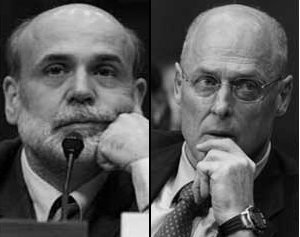 [1]
[1]My friend Biella [2] made a really good point about the financial crisis and the government bailouts this week:
Consider the position of politicians and free-market theorists who decry government regulation of financial markets. Compare that with our situation today: effectively, we now have government nationalization of much of the financial services industry. As Biella observed, the strongest possible form of regulation is to simply own the regulated entity, or to lend it money under terms so strict that they are the equivalent of owning it.
We have regulation either way; the only question is whether we admit it. If our policy is to bail out anything that’s “too big to fail”, then the form of our regulation is after the fact and improvisatory; that is, our policy is to regulate, but only on an emergency basis. We could choose a different policy: to regulate before the fact and on a non-emergency basis.
What we cannot choose, however, is not to regulate. That is clearly impossible.
David Brooks wrote an Op-Ed column (“The Post-Lehman World” [3]) in the New York Times today, in which he argues, half-persuasively, that current calls for greater regulation in the future are unrealistic and possibly the result of the same herd mentality that got us here in the first place. He makes a number of good points, but I think he missed some as well. I wrote a letter to the editor in response; probably they get a ton of those and the chances of its being published are very low. For what it’s worth, here it is:
To the Editor, David Brooks' "The Post-Lehman World" (Op-Ed, September 19th) is excellent, but he overlooks a subtle point when he writes: "As McArdle notes, cracking down on subprime loans just when they were getting frothy would have meant issuing an edict that effectively said: `Don't lend money to poor people.' Good luck with that." This is a misunderstanding of what was happening. Poor people do not benefit by being made loans they cannot repay. And, ordinarily, lenders do not benefit by making loans they cannot collect. However, a lender who makes many such loans and then sells them off, packaged as something less risky than they actually are, does benefit -- and it is precisely this deceptive practice that cried out for regulation. It was easy to detect; we cannot plead ignorance. When large numbers of unqualified borrowers are being given inappropriate loans, it's not hard to figure out that it's happening. Everyone who worked in the mortgage industry knew -- even if those on the bottom rung were not aware that the ultimate driving force was the desire to sell mislabeled debt packages. Regulating that mislabeling would have left everyone better off: poor people, lenders, and now all U.S. taxpayers. Despite Brooks' pessimism, stopping the cycle would have been politically possible, by an administration that cared to stop it and knew how to explain to the public that overly-easy credit helps no one. Certainly, much of the public understands it now. -Karl Fogel